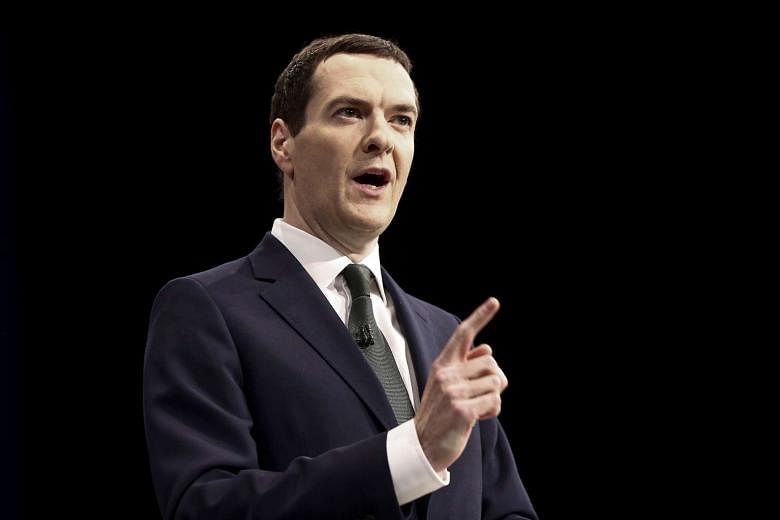MANCHESTER • Mr David Cameron has no one else to blame. He announced that he would not run for another term as Britain's prime minister even before he led his Conservatives to a surprising majority at the general election in May, so manoeuvring for his job is under way.
The party's annual convention this year has been less about him and more about providing an audition of sorts for potential successors keen to win hearts and minds.
Potential candidates have seized the chance to raise their profiles, woo supporters and play to the gallery while professing loyalty to their leader.
In a powerful speech on Monday, Chancellor of the Exchequer George Osborne positioned the Conservatives as the party of the centre, gleefully appropriating a few policies long associated with the opposition Labour Party.
On Tuesday, attention was focused on Home Secretary Theresa May, who shifted her profile to the right with harsh language and a stark warning over rising immigration. If not controlled, she argued, migration threatened to make a "cohesive society" impossible.
-
Front runners in race for Tory leadership
-
GEORGE OSBORNE, CHANCELLOR OF THE EXCHEQUER
The 44-year-old, who is a close ally of Prime Minister David Cameron, is of aristocratic descent and has a large personal fortune. He has vowed to fight for the workers of Britain.
He has made inroads into the traditional territory of the opposition Labour Party with recent policy announcements, perhaps with an eye to broadening his appeal. These include an increase of the minimum wage to £9 (S$19) by 2020 for those aged over 25, from £6.50 currently, and an infrastructure planning commission headed by a Labour peer.
Polls indicate that Mr Osborne has not always been popular among the general public, and his reputation as the champion of Britain's austerity programme saw him booed by a stadium of spectators at the 2012 Paralympic Games.
THERESA MAY, HOME SECRETARY
The 59-year-old has made her leadership pitch on a platform of asylum reform and immigration tightening that drew criticism even from the right-wing press.
She told the Conservative party conference that mass immigration is damaging British society and suggested that European Union rules of free movement may have to be changed to reduce the number of foreigners going to Britain. She promised a tough approach on the issue that will influence Britons' choice of whether or not to leave the EU. Her speech was criticised by business groups, with the Institute of Directors attacking its "irresponsible rhetoric".
BBC, AGENCE FRANCE-PRESSE
Then, lacing a highly political speech with trademark humour, Mr Boris Johnson, the charismatic lawmaker and departing mayor of London, delivered an appeal to "one-nation" or inclusive Conservatives - while keeping open the possibility that he could back a British exit from the European Union in a referendum that Mr Cameron has promised by the end of 2017.
According to British media, as many as 18 Conservative lawmakers aspire to the leadership. The prospect of succeeding Mr Cameron is particularly enticing because of the dismal fortunes faced by the other parties since the May polls.
Although his party achieved only a small majority, the centrist Liberal Democrats, who had been in coalition with the Conservatives, saw their seats slump to eight. Meanwhile, the Labour Party has swung to the left, electing as its leader Mr Jeremy Corbyn, a veteran of the left-wing fringes.
Even the populist, right-wing UK Independence Party has been torn by infighting since the elections, in which it secured more than 12 per cent of the vote but just one seat.
The Conservatives, however, face their own internal strains, notably from issues that include Europe, migration and welfare.
Mr Cameron's promise to hold a referendum on British membership in the EU has heightened passions over a subject that has been divisive for Conservatives since 1990. At the time, then Prime Minister Margaret Thatcher was rejected by her own party partly because of her resistance to European integration.
Mr Cameron has said he wants Britain to stay in the bloc, provided that he can negotiate an improvement in Britain's ties with the EU before holding the vote.
One of his demands is that Britain be allowed to impose restrictions on welfare entitlements for migrants. The coalition government, which Mr Cameron has led since 2010, has failed badly in trying to reach its goal of reducing net immigration numbers to fewer than 100,000 a year.
Ms May, who once appealed to the Conservatives to shed their image as what she termed the "nasty party", promised on Tuesday to shake up the asylum system - perhaps because there is little that she can do to restrict migration from within the EU.
For now, Mr Osborne is the man to beat, because his stewardship of the economy since 2010 is credited by many with having brought election victory to the Conservatives, but he has long struggled to connect with the public.
"Something about his black curls and pale face," Mr Charles Moore, a former editor of The Daily Telegraph, wrote of Mr Osborne in 2008, "makes him look like a powdered French aristocrat in 1790, staring affrighted from the window of his carriage as the sans-culottes start trying to turn it over."
More recently, others have likened his new haircut to that of Julius Caesar.
Mr Osborne has made a concerted effort to humanise his image and, in a recent interview with The Mail, he discussed how he wooed his wife, how he went on a diet for fear of becoming "fat and flabby", and his fondness for rap group N.W.A.
NEW YORK TIMES


